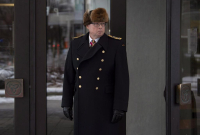Support strong Canadian climate journalism for 2025
New court documents have sketched out the Crown's case against Vice-Admiral Mark Norman, alleging the suspended military officer tried to undermine and influence the federal cabinet's decision-making on a shipbuilding project for more than a year by leaking government secrets.
The documents were filed in an Ottawa court on Thursday and are the first to shed light on the specific allegations and arguments that prosecutors are expected to make when Norman's high-profile case comes to trial next August.
Suspended as the military's second-in-command in January 2017, Norman was charged this past March following a lengthy RCMP investigation with one count of breach of trust. He has denied any wrongdoing and vowed to fight the charge.
The case revolves around a $700-million contract with Quebec-based Davie Shipbuilding to refit a civilian vessel into a support ship for the navy. The Harper government launched negotiations in 2015, but the deal was not finalized before the Liberals took office.
Previously released documents indicated that the RCMP believed Norman tried to help Davie mount a pressure campaign on the newly elected Trudeau government by leaking it government secrets after a Liberal cabinet committee decided in November 2015 to revisit the deal.
But in the new documents, the Crown alleges Norman provided Davie, its lobbyists or the media with secret information on at least 12 occasions starting in September 2014 — before the Harper government had decided to move ahead with the project.
The Crown alleges that "the leaks were strategic: the leaks were made at times when either Mr. Norman was displeased with the direction or decision being taken by a civil servant ... or when he knew cabinet was considering or nearing a decision point.
"In the latter case, leaks of information to Davie would provide leverage in negotiations or to allow their lobbyists to fine-tune their efforts."
The documents include excerpts from — and summaries of — a number of emails and text messages between Norman and Davie executive Spencer Fraser and then-CBC journalist James Cudmore, who wrote several stories about the project.
Norman's lawyers have previously argued that his only concern was for the good of Canada and the navy, which desperately needed a support ship to conduct overseas deployments after retiring its only two in 2014.
They have also said that much of the information was already known to Davie or the media, either through other leaks or because the nature of the deal between the shipyard and the government meant the two sides were in regular contact.
But the Crown alleges the nature and content of Norman's communications — including the use of a private email account and repeated references to the need for secrecy — show that he knew he was operating outside his bounds as a military officer and public servant.
"When leaking this information, it was Mr. Norman's intent to undermine the decision-making process of cabinet, and the principle of cabinet confidence," the Crown writes.
"It was also his intent to undermine the lawful and accountable decision-making process to be followed by civil servants. As several communications reveal, he sought to conceal his involvement in the provision of the information."
As for his motive, the Crown argues that it is irrelevant as the case should focus on whether Norman broke not only the law but also the rules and guidelines that he accepted when he became a military officer, which include supporting the government.
"He is charged for breaking rules that he swore to uphold," the Crown writes.
"Rules that, to him, had become inconvenient; rules that were frustrating what he thought was important and what he wanted; rules that protected the responsible decision-makers and their decision-making process; rules that stood in his way."
The documents filed Thursday are in response to a request by Norman's lawyers for thousands of government documents related to the Davie project, many of which are considered cabinet secrets or confidences.
The two sides are scheduled to present arguments over five days starting next Wednesday on why the documents are — or are not — relevant to the case, and whether they should be released to Norman, his lawyers and the public.





Comments